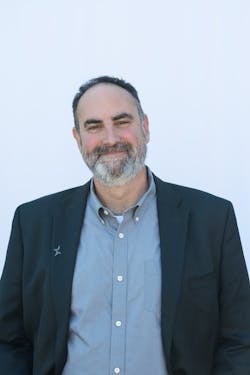When the phone rang on July 19, Kevin Rains, owner of Center City Collision and Precision Frame & Body in the Cincinnati area, was surprised to find a representative from CARSTAR on the other end. Perhaps even more to his surprise, the ensuing conversation caused Rains to begin seriously considering something he had pondered for the last few years—should his family-owned and operated MSO consolidate or remain independent?
Rains knew he wanted to grow his business, but he wasn’t sure of the right move to get him to that next level. He had spent years building his brand and solidifying his place in the community. Could he reap the benefits of aligning himself with an MSO while still retaining control of his business?
The Background:
The Rains family has been repairing cars for over 40 years and has built up its reputation as a family-owned and operated MSO in Ohio. His sister, Kelli Rains-Back, owns and operates Valley Collision Center in Amelia and his father, Gary Rains, owns Gary Rains Body Shop in Western Hills.
The Problem:
Rains says he always thought a day might come when he would consolidate. While he has become known in the industry for his marketing expertise, Rains says he struggled with operations, at times. He wanted his company to grow, and although it was, it wasn’t growing as quickly as he would have liked. With big-name MSOs having more brand recognition and access to DRPs, Rains wasn’t sure how he would be able to compete. And while it was a conversation he was open to, he wasn’t immediately sure if joining a franchise was the right choice.
The Options:
While the increased reach and benefits that consolidation would bring were major benefits for Rains, losing his shop family-owned identity was a major concern. Rains was faced with a number of different options: He could remain independent, join his family's business under one roof, sell his business to a consolidator or he could align with a franchise.
Remain Independent: Company culture is very important to Rains and he did not want to lose that. The family-owned and operated MSO grew from one location in 1978 to four locations total. The Rains name meant something and had built up a reputation in the community. Rains wasn’t sure he was ready to give all of that up.
Band Together: The Rains family could band under one name and create a four-shop, independent MSO. The only problem, he says, is that the family members are in different stages in their life.
As soon as Rains got the call, he contacted his sister to discuss the opportunity.
Rains knew he wanted to stay in the industry for a number of years, as did his sister, who just recently opened her shop. Their father, however, was thinking about retirement and didn’t want to hand over the reins.
With the family on different pages, coming together under an independent banner wasn’t a consideration.
Go with a Different Consolidator: Rains had been approached by two other consolidators in the past, but those conversations didn’t go far, as Rains wasn’t ready at the time and didn’t want to lose his shops’ identities.
Align with a Franchise: Rains felt joining a franchise would offer him guidance and the reach he needed to improve operationally. CARSTAR, in particular, would also bring him more DRP work, something that he had struggled with in the past. Both of Rains’ shops had two DRP accounts and he said that a new one would come every six or seven years. At the CARSTAR Discovery Day that Rains attended, he learned that CARSTAR shops had an average of 10 DRP accounts.
CARSTAR would also let Rains stay in control of the shop, something that his employees were concerned about when he broached the idea. Once Rains reassured them that they would still be working for him and that they wouldn’t have to deal with a corporation, all employees were on board. Some of his employees had even previously worked for CARSTAR and were able to give him insight.
The biggest hang-up Rains had was the issue of rebranding. If he went with CARSTAR, that would mean he would have to change over all of his signage and operate under a name that wasn’t his own.
The Solution:
Ultimately, CARSTAR was most appealing because the company had a large Cincinnati presence and had built a reputation that Rains thought he could utilize. With CARSTAR, he could maintain his shop’s culture while increasing his reach. In addition, another MSO had recently acquired 10 area CARSTAR shops, which opened up the market for Rains.
CARSTAR had approached his sister as well, and they started to bounce ideas and concerns off of one another. Rains says he would have made the same decision regardless of his sister, but he thinks she helped him slow down and consider everything.
Rains also contacted CARSTAR shop owners in different areas of the county to get their honest, candid opinion of what it was like working with the company.
He discussed the idea with his advisory board, a group of six business owners he meets with quarterly, and had in-depth discussions with his CFO and controller. They drew up financial reports that outlined increased work the shop could expect from aligning with CARSTAR, showing the shop could stand to make more money—even with CARSTAR’s fees.
The board’s largest concern was the importance of his brand, which would undergo a drastic change. Although it was tough parting with the brand he single-handedly created, he concluded signing with CARSTAR would allow him to maintain his culture and still perform employee bonding activities, like hosting team lunches.
After weighing the options, he decided CARSTAR presented more benefits for his business than remaining independent would. In late September, he finalized the deal and his shops officially became CARSTAR Westchester and Center City.
The Aftermath:
While Rains’ sister signed with CARSTAR at the same time, his father has decided not to align with the franchise, although he has not ruled out the possibility.
Because the acquisition is brand new, the signage and branding haven’t been changed yet. Rains says he believes that will transition over the next 60–90 days, with the help of an immersion specialist.
When it comes to letting his customers know, he’ll continue to give away SWAG as he did before, only this time it will have CARSTAR on it. He also plans to send out mailers and make social media posts to alert customers of the change.
The Takeaway:
“Even with this decision, we’re still under the same ownership and we’re still a family operation,” Rains says. “I want to communicate to everyone that we’re going to be the best of both worlds. I feel like it’s all gain.”
Rains says that through all of the coaching and benchmarking that CARSTAR provides, he’ll be able to better figure out his operations and how to make his shop more efficient.

